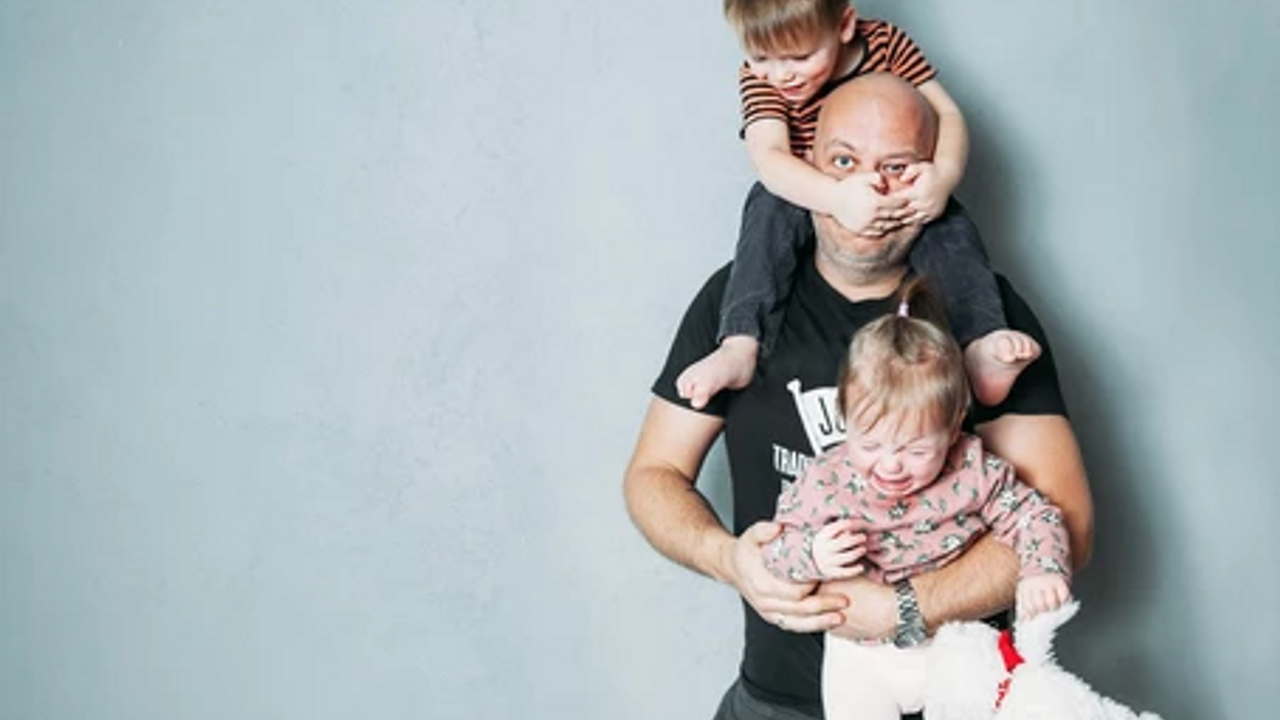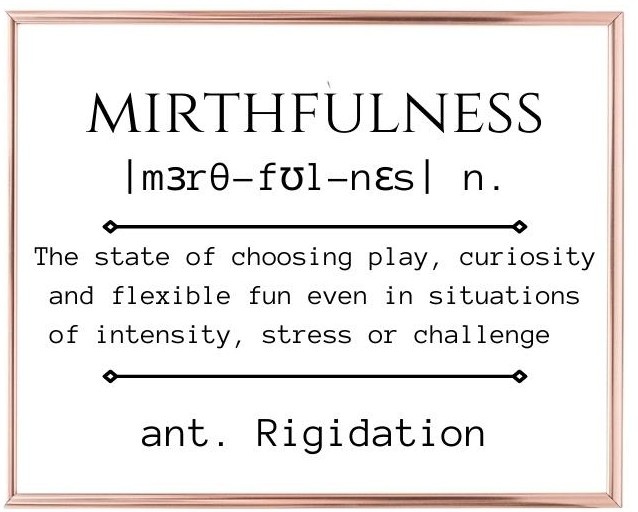
A Mindfulness Practice for Stressed-Out Parents
Try this mindfulness practice the next time that mean inner voice pops up and starts making parenting harder than needs to be.
In spite of my bookshelf from graduate school, much of what I’ve learned about parenting has come from my parents, and my own experience as a parent—as it has for us all. I’m a clinical psychologist who has spent the better part of 20 years specializing in the treatment of children, as well as in counseling parents. I’m trained, licensed, experienced, and even fairly well-read. And as a parent myself, I can honestly answer “that” question from anxious parents coming to me for help–whether my understanding of what they’ve been through extends from professional to personal. So yes, I know quite a bit professionally and personally about parenting.
Parents need a new way to relate to the inevitable suffering and universal emotional pain of parenthood.
Across all of my work and home forays into the intricacies of parenting, one truth shines through: the emotional pains of modern parenting are universal. ALL parents come up against significant surges of strong negative feelings and, unfortunately, many get mired in needless suffering as a result of what’s happening internally—how they’re reacting to these painful emotions. This truth has led me to the following conclusion: Parents need a new way to relate to the inevitable suffering and universal emotional pain of parenthood.
7 Universal Parenting Worries (and Difficulties)
There’s an inner skill set called for in parenting—an awareness of what is, what’s changing, and what matters going forward. This awareness is elusive for many parents and may account for much of the pain behind the dismal sociological research suggesting high rates of anxiety, stress, and depression among parents.
There are universal parental pains, tremors that shake us from diligent skillfulness and dip us into far reaches of emotional upheaval. Common to all contemporary parents are pains such as:
Fears for our children: Will they be hurt, unloved, or in some way miserably treated by fate and a friend who betrays?
Frustration and angst: When things go awry, or our best-laid plans slip away, or things just aren’t turning out the way we had envisioned.
Overwhelm: When the demands our children, young or much older, exceed the skills we’ve brought to bear in the past, or the resources we’ve marshaled in a particular moment.
Loss: When we witness the moments of sweetness giving way to the inevitability of change, development, and a universe of needs other than our own, and when we are saddened by the setbacks, failures, and splintered expectations for our children.
Guilt: Over the seemingly never-ending examples of bars set and our performance lacking, of our falling short in doing what we intend as parents, and perhaps doing things, consciously and otherwise, causing pain to our children.
Confusion: When a situation stumps us and our usual parenting tools, guidebooks, and rule-of-thumb road maps leave us stranded and exposed.
Fear for ourselves: When needs go unmet, careers are stunted or in some way threatened, relationships whither, addictions rage, and we become resigned to futures foreshortened by the unending press of the next generation.
These are the universal domains of parental struggle, the inner pressures we struggle with and against, the seismic challenge that children present to our psyches—our daily sanity. And some aspect of all of these is absolutely inevitable. These are the pains of parenthood creating my motivation for writing and working with parents.
Be Kind to Your Inner Parent
What parents need is help walking with, instead of struggling against, their pain, confusion, and doubt. Leave the rationales to sociological, political and even religious debates, because here we’re focusing on the nitty-gritty of making parenting not just a tolerable ordeal, but an opening, a doorway to the widest possible array of experience—the grandeur and the gore.
What parents need is help walking with, instead of struggling against, their pain, confusion, and doubt.
What I’m talking about here is less about the ins and outs of managing relationships with our children—many books, entire aisles at bookstores, are filled with this kind of advice. I’m speaking about standing in place and facing ourselves internally as parents. What I’m referencing is our relationship with ourselves, with the pain we so readily magnify through unskillful means into unnecessary suffering.
I’m not aware of any tool or strategy for ending the inevitable pain of parenting. I’m assuming there is none. The vivid momentum of sweet moments such as when our kids first learn to pump their legs on the swing will eventually go still. Young kids will walk out of our sight and we’ll surge with fear. Older kids will hurl dagger eyes and sledgehammer words at us across the years, and even when they’re only three feet tall, and there will never be a time when our emotional buttons out of their reach.
The whining will continue. Our sleep will indeed be interrupted, either through their crying in their childhoods or our worrying in their adulthoods. They may be disabled or in endless ways hampered from the easy happiness we wished for them. We will have no clue what to do in that crossroad moment as they hover in the doorway, their eyes expecting our parental reaction to save them. Every other life domain—our jobs, our relationships, our own extended families—will press at us just as they ask for one more thing. And they may lose more than their fair share in life.
In the face of all of this, I invite you to meet your parental Mind–not simply glance at yourself in a mirror, but really meet and greet your inner voice (in the harsher moments of parenting, it’s more often a judge, jury, and executioner) and take a long hard look at this inner relationship. “You aren’t good enough,” it often says. “You can’t handle these kids . . .” “. . . Bad things will happen . . .” “. . . They are ungrateful, and you’ll never have a life of your own.” That voice in your head never stops its yammering, and it makes parenting harder than it needs to be. This is why you need to carve out some time to kindly examine, and create some space around your internal parental critic.
With a dedicated mindfulness practice, you can learn to teach your angst-primed brain to stay sitting and smarting on the carpet of your mental and emotional experience and bide your time until the pain shifts and changes on its own. Because it will.
I’m not asking you to ignore that voice, I’m asking you to stay with your pain, and regard mind like a puppy being trained. With a dedicated mindfulness practice, you can learn to teach your angst-primed brain to stay sitting and smarting on the carpet of your mental and emotional experience and bide your time until the pain shifts and changes on its own. Because it will. Your thoughts come and go, like clouds in the sky. By practicing “letting your thoughts be just thoughts” and watching them move by, you can train your parental brain to let the pain be as it is, and not chide and mishandle it into the beast that most of us have known in our lesser moments as parents. Pain, yes—suffering, no.
A Mindfulness Practice for Stressed-Out Parents
When pain, whether physical or emotional, shows up, it’s helpful to have built the capacity to mindfully notice it, allow it to just be there, and watch as it changes and typically eases on its own. It’s when you push and poke at it, trying to force pain to leave, that it often hangs around and grows into mind’s best bad-tempered friend, suffering.
You can lean to “rest” in the experience of pain and not add to it with mind’s angst and agendas. The mindfulness term for this is “acceptance.” And by acceptance, I don’t mean resignation—the sense of giving up and being defeated by the pain of parenting. No, it’s an active, empowered choice to lie back and let pain move through you. What you need to do is to take a “N.A.P.” with the pain that shows up in your daily life as a parent. Here are the steps:
Notice and observe the painful sensations in your body and any accompanying thoughts as they show up.
Allow it all to be just as it is, without trying to change anything.
Pass the pain on through, rest into the moment until your painful thoughts and feelings pass through and away from you.
The next time you find yourself having difficulty with your children, in whatever way that shows up for you, give this acceptance practice a try. I’d advise starting with more do-able situations – the “low hanging fruit” within easy reach of your skills for attention and spacious awareness.
With practice, you’ll be able to take a “nap” even amid that louder, more intense or historically angst-ridden episodes. Be patient with yourself. Again, these “pains” of parenting are universal. No one is immune, and we’re all walking together this path toward more mindfulness in relating to our kids. That’s why it’s called “practice,” not perfection.
Stay connected with news and updates!
Join my mailing list to receive the latest tools, resources and compassionate nudges to own more moments in every aspect of your daily life
We hate SPAM. We will never sell your information, for any reason.

